
CATALYSIS SURVEYS FROM ASIA
Scope & Guideline
Empowering Catalysis Research Through Open Access Collaboration
Introduction
Aims and Scopes
- Catalytic Mechanisms and Processes:
The journal publishes detailed studies on the mechanisms of catalysis, including reaction pathways and kinetics, providing insights into how catalysts function at the molecular level. - Synthesis and Characterization of Catalysts:
A significant focus is on the synthesis of new catalytic materials, including metal-based, metal-organic frameworks, and nanocatalysts, along with their characterization using advanced techniques. - Environmental and Sustainable Catalysis:
Research addressing catalysts that facilitate sustainable chemical processes, including waste minimization and the conversion of renewable feedstocks, is a core area. - Photocatalysis and Electrocatalysis:
The journal highlights studies on photocatalytic and electrocatalytic systems for energy conversion and environmental remediation, showcasing advancements in these rapidly evolving fields. - Applications in Fine Chemicals and Pharmaceuticals:
There is a consistent emphasis on the application of catalytic processes in the synthesis of fine chemicals and pharmaceuticals, indicating the journal's relevance to industrial applications.
Trending and Emerging
- Sustainable and Green Catalysis:
There is a marked increase in research focused on sustainable catalytic processes, including the use of renewable resources and environmentally benign methods, highlighting the journal's commitment to green chemistry. - Nanocatalysts and Nanomaterials:
The exploration of nanocatalysts, particularly those with enhanced surface area and reactivity, is a growing trend, indicating ongoing advancements in materials science and catalysis. - Electrocatalysis for Energy Conversion:
Research on electrocatalytic processes, particularly for fuel cells and renewable energy applications, is gaining traction, reflecting the importance of energy sustainability. - Photocatalytic Applications in Environmental Remediation:
The increasing focus on photocatalysis for the degradation of pollutants and environmental cleanup demonstrates a significant trend towards addressing environmental challenges through innovative catalytic solutions. - Integration of Artificial Intelligence in Catalysis Research:
Emerging studies incorporating AI and machine learning techniques for catalyst design and optimization are on the rise, indicating a modern approach to accelerating catalysis research.
Declining or Waning
- Traditional Homogeneous Catalysis:
While still relevant, there is a noticeable decline in the publication of studies focused solely on traditional homogeneous catalysts, as the field shifts towards more sustainable heterogeneous systems. - Conventional Catalytic Processes:
Papers discussing well-established catalytic processes without novel contributions or improvements are becoming less frequent, indicating a shift towards innovative and transformative approaches. - Simple Catalyst Characterization Techniques:
Research relying solely on basic characterization methods without integrating advanced techniques or comprehensive analysis of catalytic performance is waning. - Catalysis in Non-Green Chemistry:
Topics that do not align with green chemistry principles or sustainable practices are seeing decreased publication frequency, reflecting the growing emphasis on environmentally friendly approaches.
Similar Journals
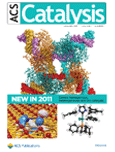
ACS Catalysis
Advancing Catalytic Innovations for a Sustainable FutureACS Catalysis, published by the American Chemical Society, stands as a premier journal in the field of catalysis, offering a vital platform for researchers, professionals, and students focused on advancing the science of catalysis and its applications. With an impressive impact factor placing it in the Q1 category for both Catalysis and Chemistry (miscellaneous), this journal has established itself as a leading source of high-quality research findings, currently ranking #21 out of 408 in General Chemistry and #9 out of 68 in Catalysis according to Scopus. Since its inception in 2011, ACS Catalysis has aimed to publish innovative research that addresses the critical challenges in catalytic processes, advancing our understanding of both fundamental and applied aspects of catalysis. With a commitment to promoting open scientific discourse, it serves a vital role for those interested in the latest methodologies, discoveries, and trends in this essential discipline. Based in Washington, DC, ACS Catalysis continues to uphold the highest standards of scholarship and collaboration within the vibrant community of chemists and engineers worldwide.
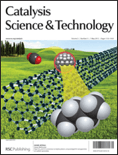
Catalysis Science & Technology
Pioneering Discoveries in Catalytic ScienceCatalysis Science & Technology is a leading journal published by the Royal Society of Chemistry, dedicated to advancing the field of catalysis through high-quality research and innovation. Established in 2011, this journal serves as a vital platform for researchers, professionals, and students interested in the latest developments in chemical engineering and catalytic processes. With an impressive Q2 ranking in Catalysis for 2023, the journal is recognized for its significant contributions to the discipline, evidenced by its respectable Scopus Rank of #21 out of 68 in the category and a 69th percentile standing. The journal is committed to disseminating original research that enhances our understanding of catalysis, facilitating knowledge exchange and collaboration within the scientific community. Even without Open Access, Catalysis Science & Technology remains pivotal in shaping innovations that drive forward both academic inquiry and industrial applications, making it an essential resource for anyone involved in this dynamic field.

CCS Chemistry
Empowering Global Chemistry Research Without BarriersCCS Chemistry, published by the esteemed Chinese Chemical Society, is a leading open-access journal dedicated to advancing the field of chemistry. Since its inception in 2019, the journal has rapidly gained recognition, achieving a remarkable impact factor that places it in the prestigious Q1 category in Chemistry (Miscellaneous) as of 2023. With a Scopus ranking of #41 out of 408 in General Chemistry, CCS Chemistry represents the top 10th percentile in its category, reflecting its commitment to high-quality research and innovation. The journal serves as a vital platform for researchers and professionals to share their findings, showcase cutting-edge methodologies, and engage with the latest developments in various chemistry subfields. Accessible to a global audience, CCS Chemistry ensures that groundbreaking research is available without barriers, making it an indispensable resource for students and academics aiming to stay at the forefront of chemical sciences. For further details, submissions, and access to published articles, please visit the journal's website.
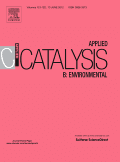
Applied Catalysis B-Environment and Energy
Exploring cutting-edge research for a sustainable energy future.Applied Catalysis B-Environment and Energy, published by Elsevier, is a leading journal in the fields of catalysis, environmental science, and process chemistry, with an impressive impact factor that reflects its significance in advancing research and innovation. Established in 1992, this esteemed journal has earned a prestigious status as evidenced by its 2023 category quartiles—ranking in the Q1 category for Catalysis, Environmental Science, and Process Chemistry and Technology. With consistently high rankings in the Scopus database, it holds a remarkable position as #1 in General Environmental Science and #2 in both Process Chemistry and Catalysis, showcasing its profound impact on the respective fields. The journal’s scope encompasses both theoretical and practical research, targeting the pivotal developments in catalysis that promote sustainable practices and energy efficiency. Researchers, professionals, and students alike will find invaluable insights and cutting-edge studies published within its pages, making it an essential resource for those invested in pioneering advancements for a greener, more energy-efficient future.

Catalysis in Industry
Unleashing the potential of catalysis in industry.Catalysis in Industry, published by MAIK NAUKA-INTERPERIODICA, is a pivotal journal in the field of chemical engineering and catalysis. With its ISSN 2070-0504 and E-ISSN 2070-0555, this journal has been dedicated to advancing the understanding and application of catalytic processes in industrial settings since its inception in 2010. Despite its Q4 ranking in the category of Catalysis as of 2023 and a Scopus rank of #61/68, the journal serves as a valuable platform for researchers and practitioners to disseminate innovative ideas and findings that contribute to the evolution of catalysis technology. Published in Russia, Catalysis in Industry aims to bridge the gap between academic research and industrial practice, providing Open Access options to facilitate widespread accessibility and encourage a collaborative approach to chemical engineering challenges. As the industry grapples with the demand for sustainable solutions and efficient processes, this journal remains a critical resource for the academic community, aspiring professionals, and students eager to deepen their knowledge in catalytic applications.
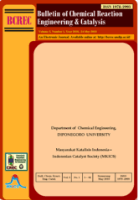
Bulletin of Chemical Reaction Engineering and Catalysis
Connecting Innovators in Reaction Engineering and CatalysisBulletin of Chemical Reaction Engineering and Catalysis is a distinguished open-access journal published by UNIV DIPONEGORO, focusing on pivotal advancements in the fields of chemical reaction engineering and catalysis. Since its inception in 2008, this journal has served as a vital platform for disseminating cutting-edge research, catering to a diverse readership that includes researchers, professionals, and students in chemical engineering and related disciplines. With its dedication to publishing valuable insights, the journal has been indexed in Scopus and boasts respectable rankings across various categories, including Q3 in Chemical Engineering (miscellaneous) and Q4 in Catalysis as of 2023. It continues to foster scholarly dialogue and collaboration by providing an accessible means for contributors to share their findings. Operating from Semarang, Indonesia, this journal underscores its commitment to advancing knowledge in chemical sciences, making it an essential resource for those engaged in the study and application of chemical processes.
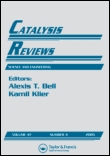
CATALYSIS REVIEWS-SCIENCE AND ENGINEERING
Navigating the Frontiers of Catalytic ScienceCATALYSIS REVIEWS - SCIENCE AND ENGINEERING, published by Taylor & Francis Inc, is a leading journal in the field of catalysis, providing a vital platform for the dissemination of rigorous research and comprehensive reviews from 1968 to the present. With an impressive Q1 ranking in multiple categories, including Catalysis and Chemistry, this journal stands out as an essential resource for professionals, researchers, and students alike. Its high impact factor and esteemed Scopus ranks — including 3rd in Chemical Engineering: Process Chemistry and Technology — highlight the journal's influence and prestige within the scientific community. While primarily a subscription-based publication, the journal’s commitment to advancing the understanding of catalytic processes continues to foster innovation in various industrial applications, making it indispensable for anyone engaged in the fields of chemical engineering and applied chemistry.
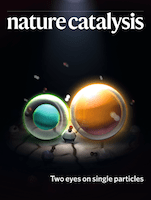
Nature Catalysis
Unleashing the Power of Catalysis in Modern ScienceNature Catalysis is a premier academic journal published by NATURE PORTFOLIO, specializing in the rapidly evolving fields of biochemistry, bioengineering, and catalysis. With its ISSN of 2520-1158, this journal has emerged as an invaluable resource since its inception in 2018, contributing significantly to interdisciplinary research. Recognized for its high impact within the scientific community, it holds a prestigious Q1 ranking across multiple categories, including Biochemistry, Process Chemistry and Technology, and Catalysis as of 2023, illustrating its influence and authority in the field. Researchers will find impactful articles characterized by rigorous peer review processes that push the boundaries of knowledge in catalysis and its applications. While the journal operates with traditional access models, it remains accessible to a global audience interested in innovative research findings that promise to shape future developments in these critical areas. Positioned at the forefront of contemporary scientific inquiry, Nature Catalysis invites contributions that expand upon catalytic processes and technologies, which are crucial for advancing both fundamental science and applied engineering.

KINETICS AND CATALYSIS
Catalyzing Knowledge, Transforming ChemistryKinetics and Catalysis is a pioneering journal dedicated to advancing the field of catalytic science and chemical kinetics, published by Pleiades Publishing Inc. Based in the Russian Federation, this journal serves as a critical platform for disseminating high-quality research related to the mechanisms of chemical reactions and innovative catalytic processes. Although currently not an open access journal, it maintains academic rigor through a comprehensive peer-review process that ensures the relevance and integrity of its published works. With a history dating back to 1968, Kinetics and Catalysis has evolved through various converged years, reflecting its commitment to interdisciplinary research within the realms of chemistry, catalysis, and the computational aspects of modeling and simulation. As evidenced by its Scopus rankings and quartiles, it stands as an influential, albeit niche, journal, appealing to researchers, professionals, and students eager to explore the intricacies of chemical transformations. The journal’s robust archive offers an invaluable resource for those seeking to expand their understanding of both theoretical and practical approaches to catalysis.
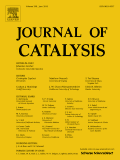
JOURNAL OF CATALYSIS
Shaping the Future of Catalysis Through ResearchJOURNAL OF CATALYSIS, published by Academic Press Inc, Elsevier Science, is a premier peer-reviewed journal that has been at the forefront of research in catalysis since its inception in 1962. With an impressive impact factor and ranking in the top quartiles of both catalysis and physical and theoretical chemistry, the journal is highly regarded, currently holding the distinction of Q1 in both fields. The journal serves as a critical platform for disseminating groundbreaking research, innovative methodologies, and theoretical advancements, making it essential reading for researchers, professionals, and students alike. Although it does not operate under an open-access model, its robust content is accessible through institutional subscriptions, ensuring that significant findings in catalysis and related fields reach a wide audience. With convergence years extending to 2024, JOURNAL OF CATALYSIS continues to shape the discourse in catalysis and chemical engineering, encouraging scholarly exchange and collaboration worldwide.